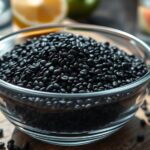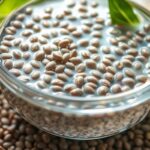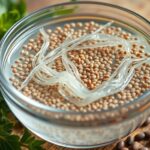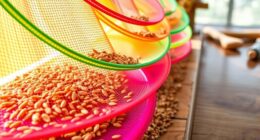For ideal health, aim to consume one to two tablespoons of chia seeds daily. This amount provides about 5 to 10 grams of fiber, helping you meet daily goals and supporting digestion. Start with a small amount, like a teaspoon, and gradually increase as your body adjusts, ensuring you stay well-hydrated. Keep in mind, moderation prevents discomfort. Stick with this routine, and you’ll discover helpful tips to incorporate chia seeds into your diet effectively.
Key Takeaways
- Consume 1 to 2 tablespoons (5-10 grams) daily for health benefits.
- Start with small amounts, like one teaspoon, and gradually increase to avoid digestive issues.
- Hydrate well when consuming chia seeds to prevent choking or blockages.
- Incorporate chia into various meals such as smoothies, yogurt, or puddings for best absorption.
- Maintain moderation to support digestion, weight management, and overall health.

If you’re wondering how many chia seeds you should eat each day to enjoy their health benefits, it’s important to find the right balance. Chia seeds are packed with nutrients, especially fiber, which plays a vital role in supporting your overall health. When considering your fiber intake, incorporating about one to two tablespoons of chia seeds daily can make a real difference. This amount provides roughly 5 to 10 grams of fiber, helping you meet the recommended daily intake of 25 to 30 grams for women and 30 to 38 grams for men. Consuming enough fiber is essential not only for digestive health but also for weight management, as it promotes feelings of fullness and reduces overeating. As a versatile addition, chia seeds can be easily incorporated into your diet by sprinkling them over cereals, blending into smoothies, or mixing into yogurt. Including chia seeds as part of a balanced diet aligns with modern farmhousestyle principles that emphasize natural, wholesome ingredients. It’s worth noting that moderation is key. While chia seeds are highly nutritious, consuming too much at once can lead to digestive discomfort, such as bloating or constipation, especially if you’re not used to high-fiber foods. To avoid this, start with a small quantity—like one teaspoon—and gradually increase your intake as your body adjusts. Also, remember to hydrate well, as chia seeds absorb liquid and expand, which aids digestion and prevents choking or blockages. By doing so, you’ll optimize their benefits without risking discomfort. When it comes to weight management, chia seeds can be a helpful ally. Their high fiber and healthy fat content help regulate your appetite, keeping you fuller for longer periods. This can curb unnecessary snacking and support your weight loss or maintenance goals. Incorporating chia seeds into meals and snacks is simple: add them to oatmeal, bake with them, or use them as a thickener in puddings. The key is consistency—regularly including a moderate amount of chia seeds in your diet can contribute to better appetite control and overall health.
Frequently Asked Questions
Can Chia Seeds Cause Allergic Reactions?
You might wonder if chia seeds can cause allergic reactions. While rare, some people with nut allergies or seed sensitivity could experience symptoms like hives or swelling. If you’ve had reactions to nuts or other seeds, it’s wise to introduce chia seeds gradually and monitor your body’s response. Always consult your healthcare provider if you’re unsure, especially if you have multiple food allergies or sensitivities.
Are There Specific Groups Who Should Avoid Chia Seeds?
If you have a nut allergy or gluten sensitivity, you should be cautious with chia seeds. They may cause allergic reactions or digestive issues in some people. While generally safe, it’s best to consult your doctor before adding chia seeds to your diet if you have these conditions. Start with small amounts to see how your body reacts, and always check labels for potential cross-contamination.
How Do Chia Seeds Affect Blood Sugar Levels?
Chia seeds can positively impact blood sugar levels thanks to their high fiber content. Their chia seed fiber helps slow down digestion, promoting better blood sugar regulation. When you include chia seeds in your diet, you may notice more stable energy and reduced sugar spikes. Just be mindful of portion sizes, as consuming too much can cause digestive discomfort. Incorporate them gradually for ideal blood sugar management benefits.
Can Chia Seeds Be Consumed During Pregnancy?
During pregnancy, you can include chia seeds in your diet, but it’s crucial to prioritize pregnancy safety. Chia seeds are nutrient-dense and can boost your nutrient intake, supporting your health and your baby’s development. Just make sure you consume them in moderation and stay hydrated, as their high fiber content can cause digestive issues. Always consult your healthcare provider before adding new foods like chia seeds to your pregnancy diet.
Are There Any Drug Interactions With Chia Seed Consumption?
While chia seeds are generally safe, you should be aware of potential drug interactions when you consume them. They contain compounds that may influence how certain medications work, especially blood thinners or blood sugar meds. As a supplement concern, it’s wise to check with your healthcare provider if you’re on medication, ensuring that chia seeds won’t interfere with your treatment plan. Better safe than sorry, after all.
Conclusion
Incorporating chia seeds into your diet is simple and beneficial, but remember, moderation is key. You might worry about overdoing it, but sticking to the recommended dosage guarantees you enjoy their health benefits without discomfort. If you find the texture or taste off-putting, try mixing them into smoothies or yogurt. With mindful consumption, chia seeds can be a versatile, nutritious addition to your daily routine—just don’t forget to stay within the suggested limits for ideal results.
















